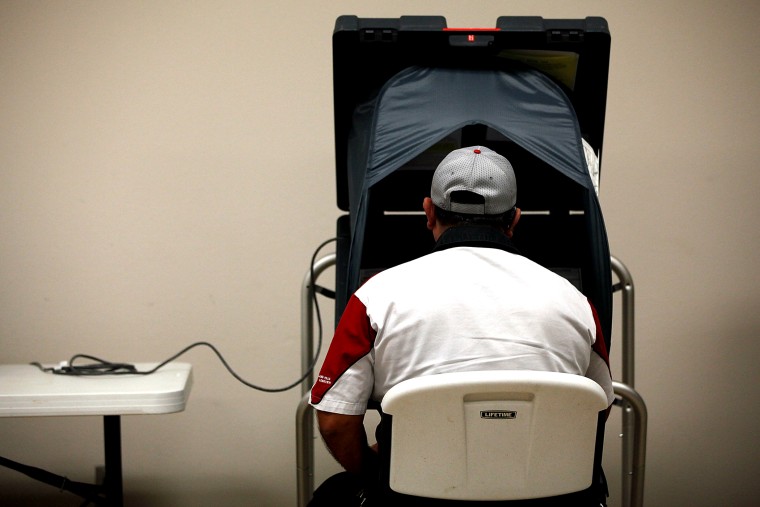After the Supreme Court wiped out the most important plank of the Voting Rights Act (VRA) last summer, a broad range of experts told msnbc that the law’s key remaining pillar may now be at risk from the court's conservatives. And lately there's concern that efforts to stop strict voter ID laws could, perversely, give Chief Justice John Roberts and co. the chance they've been looking for.
Striking down or significantly narrowing that key pillar, known as Section 2, would essentially render the most successful civil-rights law in U.S. history a dead letter.
In a nutshell, Section 2 prohibits racial discrimination in voting. Though it’s a less effective tool than Section 5—which, until it was neutered by the Supreme Court, required certain regions to get federal approval before their election laws could go into effect—it’s still an important protection. The Justice Department is using it to challenge Texas’ voter ID law, as well as North Carolina’s sweeping voting law.
Since Congress amended it in 1982, Section 2 has barred not only voting laws that are intended to discriminate against minorities, but also those that have the effect of discriminating. That’s largely because, these days, very few people in power explicitly declare an intention to racially discriminate, so a law that banned only intentional discrimination would be virtually useless.
But many conservatives, including John Roberts, think the “effects” standard is too broad. As a young lawyer in the Reagan Justice Department, Roberts wrote a memo opposing that 1982 move by Congress to broaden Section 2 to cover laws with discriminatory effects, saying it would “raise grave constitutional questions.” The 14th and 15th Amendments explicitly ban only intentional discrimination.
In a story about Attorney General Eric Holder and voting rights published this week in The New Yorker, Jeffrey Toobin sounds a similar theme.
Roberts has made it clear that he feels that intentional discrimination should be illegal, but he has expressed reservations about any other kind of government redress, based on statistics or history. “There is no question that the conservatives on the Supreme Court are on the hunt for the effects test,” [Yale Law School election expert] Heather Gerken said.
As Toobin notes, that raises the fear that if the North Carolina or Texas cases go to the Supreme Court, they could give Roberts and his allies the chance to gravely weaken Section 2, by rejecting the effects test as unconstitutional. Or, nearly as bad, by significantly narrowing when it can be used.
In fact, that’s exactly what lawyers for Texas look to have in mind in defending their state’s voter ID law. In a brief filed last fall, the state claimed that even if the law has a disproportionate impact on blacks and Latinos—and data compiled by the law's opponents make clear it does—that’s not enough to violate Section 2. If it were, Texas argued, every voting law would have to be struck down.
“No voting law will have an impact that is symmetrical across all races,” lawyers for the state wrote. “Surely the attorney general does not believe that the Voting Rights Act requires every state to abolish in-person voting and allow everyone to vote by mail, as Oregon has done. But that result logically follows from the attorney general’s contention that lack of access to motor vehicles among racial minorities prohibits Texas from enacting a voter-identification law.”
That’s a far more expansive argument than the state needed to make to defend its ID law, said Michael Li, a Dallas election lawyer who has closely followed the voter ID case. And if the Supreme Court accepted it, it would significantly narrow Section 2, making it useless for stopping voter ID laws and similar voting restrictions.
In fact, election law experts say that already, Section 2 is almost never successful at stopping laws that merely affect minorities more than whites. Otherwise, it could have been used to overturn felon disenfranchisement laws, which inarguably affect blacks more than whites and which have consistently been upheld. Rather, courts consider the full range of circumstances—is there evidence of intentional discrimination, or a history of racial bias in the area, or a very racially polarized election campaign, for instance?—in weighing whether Section 2 has been violated.
But there’s still plenty of room to narrow it further, of course.
“I’d guess that arguments would be made that the statute should be narrowly construed, because to read it more broadly raises serious constitutional questions,” one conservative Washington election lawyer told msnbc last year. “That’s how I see this as playing out.”
